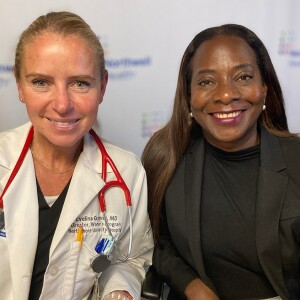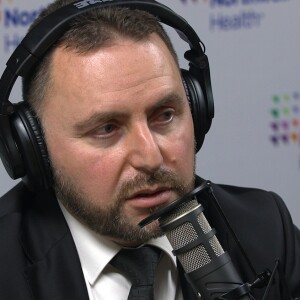Episodes

Wednesday Jun 07, 2023
Heart disease and pregnancy: Prevention, treatments and a new approach
Wednesday Jun 07, 2023
Wednesday Jun 07, 2023
Pregnancy is like a stress test on the body. Most women adapt just fine, but for some, the strain can dramatically raise the risk of heart disease — even in young women. Worse, that risk can remain elevated for years and even decades. On this episode, host Sandra Lindsay, DHS-c, RN, speaks with Evelina Grayver, MD, about how to prevent heart-related problems before, during and after pregnancy. Because heart disease continues to be the No. 1 cause of maternal mortality in the US, Dr. Grayver helped launch a cutting-edge Cardio-Obstetrics Program at Northwell Health to help detect and prevent heart issues for expectant moms.
The specialty is relatively new, so education for patients and clinicians is critical, says Dr. Grayver, who serves as director of Northwell's Women’s Heart Program for the Central Region; and is a member of the Katz Institute for Women's Health.
In this episode, she discusses the need for:
- Pre-conception counseling with a cardiologist and OB/GYN
- Understanding your risks before, during and after pregnancy
- Learning the difference between common signs and symptoms of pregnancy and adverse cardiac events like preeclampsia
- Diet and exercise during pregnancy
Additional reading
- Cardiac patient shares her renewed hope for a healthy pregnancy thanks to cardio-obstetrics program. Watch video.
- Catherine Weinberg, MD, explains that the stress pregnancy places on the heart doesn’t stop at delivery in this Expert Insights column for the Katz Institute for Women's Health.
- By addressing the influence of pregnancy, genetics or cancer on heart health, experts explain how hybrid approaches to care are making a difference.

Wednesday May 24, 2023
Preparing high schoolers for medical careers: Northwell partners with FutureReadyNYC
Wednesday May 24, 2023
Wednesday May 24, 2023
Knowing what you want to be when you grow up can be tricky, but the New York City's Department of Education internship program, FutureReadyNYC, is designed to help. The program provides high school students with exposure to professional careers; Northwell is the program's first healthcare partner. Lenox Hill Hospital on Manhattan's Upper East Side, LIJ Forest Hills Hospital in Queens, and Lenox Health Greenwich Village in lower Manhattan gave students a sense of what a career in medicine could be like. On this episode, Sandra Lindsay, DHSc, MBA, MSN, RN, speaks with two of the 65 participating teens, Suravi and Ayannah, as well as Northwell's vice president for Workforce & Community Education, Brian Aquart, who helps oversee the program.

Wednesday May 10, 2023
Understanding the options for hernia surgery
Wednesday May 10, 2023
Wednesday May 10, 2023
Of the 1 million people who need hernia surgery in the US each year, most get a procedure that inserts a mesh patch to cover the hernia. Mesh surgery has a high rate of success and satisfies most patients, but some people would rather skip the insert. There is an alternative called the Shouldice Approach: Instead of using mesh, this procedure stitches together the patient's own tissue to repair a hernia. Samer Sbayi, MD, is a leading expert in both surgical approaches and joins the podcast to explain what everyone should know about hernia repairs.
Dr. Sbayi recently joined Glen Cove Hospital and serves as associate chair of surgery. He is also a Professor of Surgery at Hofstra/Northwell.
Chapters:
- 00:01 - Intro
- 00:57 - What is a hernia?
- 01:56 - What does a hernia look like?
- 02:14 - What causes a hernia?
- 03:15 - When to worry about hernia pain
- 04:27 - Types of hernias
- 06:17 - When do you need hernia surgery?
- 07:29 - Hernia surgery: Mesh vs meshless
- 08:33 - Shouldice Approach: a no mesh hernia repair
- 10:01 - History of hernia surgery
- 11:32 - Training at the Shouldice Hospital
- 12:35 - Who should get a Shouldice hernia repair?
- 14:34 - A robotic approach
- 16:22 - Hernia surgery complications
- 18:50 - Training residents in meshless hernia repair
Thursday Apr 27, 2023
Pregnant while Black: A conversation with Dr. Monique Rainford
Thursday Apr 27, 2023
Thursday Apr 27, 2023
On this episode, Sandra Lindsay speaks with Monique Rainford, MD, about her new book, "Pregnant While Black: Advancing Justice for Maternal Health in America." The Yale Medicine OB-GYN discusses the role implicit bias and institutional racism play in the birthing experience for Black women in the United States. She offers strategies to reduce maternal mortality rates, which are three times higher for Black women than their white peers.
Wednesday Apr 12, 2023
Better care for Black mothers and babies
Wednesday Apr 12, 2023
Wednesday Apr 12, 2023
For too long, Black women have faced high maternal mortality rates, largely due to institutional bias, says Dawnette Lewis, MD, director of Northwell Health's Center for Maternal Health. She joins host Sandra Lindsay, RN, DHSc on this episode during Black Maternal Health Week to discuss the barriers to care Black women face, and what her team is doing to improve access to life-saving services before, during, and after pregnancy. Dr. Lewis has practiced for more than 20 years in maternal-fetal medicine and now oversees all aspects of Northwell’s Maternal Health Program.
Read more about our efforts to reduce maternal mortality and morbidity through the Katz Institute for Women's Health.
Wednesday Mar 29, 2023
Emergency NYC: A new Netflix series featuring Northwell
Wednesday Mar 29, 2023
Wednesday Mar 29, 2023
This new docu-series follows the lives of a diverse cast of healthcare pros, including paramedics, nurses, emergency physicians and surgeons. On this podcast, we speak with two of the people featured in Emergency NYC: David Langer, MD, and his patient Julian Primiano, a young opera singer who underwent brain surgery. Dr. Langer is the chair of neurosurgery at Lenox Hill Hospital, one of several Northwell hospitals where filming took place. Others include: Cohen Children's Medical Center, North Shore University Hospital, Long Island Jewish Medical Center, Huntington Hospital and South Shore University Hospital. Cameras even followed one Sky Health flight nurse through her day-to-day working Northwell's state-of-the-art emergency helicopter service.
Both Julian and Dr. Langer share their struggles and triumphs and what it's like to watch their journey on Netflix.
More from the experts
-
Dr. Langer shares his experience suffering a spinal cord injury in this op-ed in MedPage Today.
-
Lenox Hill Hospital first in Manhattan to use brain mapping technology
-
Learn common causes of pain under the left rib cage.
-
Have pain under the right rib cage? An emergency medicine physician breaks down the most common causes, and what to do for each.
Wednesday Mar 22, 2023
The healing power of ECT (Part 2)
Wednesday Mar 22, 2023
Wednesday Mar 22, 2023
In Part 2 of this deep dive into ECT, which stands for electroconvulsive therapy, Sohag Sanghani, MD, director of the ECT service at Zucker Hillside Hospital, talks about how the treatment was born, from its invention in 1938 by Italian scientists Ugo Cerletti and Lucio Bini, to the advent of modified ECT, to it’s impact today. He shares the importance of shedding stigma around ECT, which continues to create barriers to a highly effective therapy for those living with severe depression, psychosis and other behavioral health conditions.
Listeners can find Part 1 of this conversation with Dr. Sanghani in our feed, or read the podcast transcript here.
Chapters:
- 00:01 - Intro
- 01:10 - Unmodified ECT vs modified ECT
- 02:59 - A complicated history
- 04:06 - Dispelling myths, removing stigma
- 06:12 - Who should not get ECT?
- 06:49 - ECT in pregnancy
- 07:15 - History of ECT
- 09:20 - Before ECT, camphor used to treat depression
- 12:38 - ECT training course
More from Northwell Health:
- Learn about ECT from the patient's perspective.
- The healing power of vagus nerve stimulation
Wednesday Mar 08, 2023
The healing power of ECT
Wednesday Mar 08, 2023
Wednesday Mar 08, 2023
Electroconvulsive therapy (ECT) carries stigma thanks to negative portrayals in movies like "One Flew Over the Cuckoo's Nest." Such portrayals hide ECT's true value — and the truth about the treatment: ECT has a decades-long track record of safety, and it offers a fast-acting solution for difficult-to-treat severe depression. ECT is also effective for patients with suicidal ideation or depression with psychosis or catatonia, says Sohag Sanghani, MD. He joins Sandra Lindsay, RN, and Rob Hoell to dispel myths and misunderstandings around ECT. In Part 1 of this two-part episode, the director of the ECT service at Zucker Hillside Hospital — which was among the first few in the US to ever use ECT in 1941 — explains how ECT works, who benefits from the treatment and how it changes lives.
Chapters:
- 00:01 - Intro
- 01:33 - ECT patient perspective
- 03:36 - What is ECT?
- 04:49 - What happens during ECT?
- 06:10 - Evolution of ECT
- 07:11 - Who gets ECT?
- 08:26 - Is ECT more effective than medications?
- 10:20 - Continuation ECT
- 11:38 - ECT's impact on patients
- 12:34 - What makes ECT so effective?
- 14:48 - ECT side effects
- 17:56 - Life after ECT treatment
More from Northwell Health:
- Learn about ECT from the patient's perspective.
- The healing power of vagus nerve stimulation
Wednesday Feb 15, 2023
Why Black women are at higher risk of heart disease — and what we can do about it
Wednesday Feb 15, 2023
Wednesday Feb 15, 2023
Stacey Rosen, MD, joins Sandra Lindsay on this 20-Minute Health Talk to discuss why heart disease disproportionately impacts Black women, what factors contribute to their risk and what health systems like Northwell are doing to change the statistics.
Meet the expert
Stacey Rosen is the senior vice president of Katz Institute for Women's Health at Northwell Health; partners council professor of women's health at the Donald and Barbara Zucker School of Medicine at Hofstra/Northwell; and a spokeswoman for the American Heart Association.
Sandra Lindsay, DHSc, MBA, MSN, RN, is Northwell’s ambassador to raise health locally, nationally and globally. She leads the health system in expanding knowledge of issues that affect community health, public policy and other aspects of health care. She spent spent 29 years in nursing, most recently serving as director of critical care nursing at a Long Island Jewish Medical Center in New Hyde Park. On December 14, 2020, Sandra volunteered to become the first American vaccinated with the Pfizer and BioNTech Covid-19 vaccine.
Chapters
- 00:01 - Intro
- 00:39 - Why sex, gender and background matters
- 02:49 - Risk factors in Black women
- 05:06 - What can you do?
- 06:26 - Making research more accessible
- 07:47 - The social determinants of health
- 09:30 - Prioritizing yourself
- 11:52 - Recognizing symptoms
- 14:10 - Where should women get their health information?
- 16:09 - What are health system's doing?
- 17:57 - Finding your healthcare partner
- 20:33 - A roadmap for heart-healthy living
Wednesday Feb 08, 2023
What everyone needs to know about obesity
Wednesday Feb 08, 2023
Wednesday Feb 08, 2023
There are many misconceptions around weight — starting with the fact that people burn fat differently depending on their size, says Mitchell Roslin, MD, director of bariatric surgery at Lenox Hill and Northern Westchester hospitals. On this episode, he breaks down the factors that contribute to obesity, from genetics and lifestyle to the way our bodies convert food into energy. Obesity itself has an impact on one's ability to lose weight due to something he calls the "metabolic switch." Dr. Roslin explains how weight gain is linked to other illnesses like cancer and when people should consider talking to their doctor about medical weight loss strategies, such as medications and weight loss surgery.
Dr. Roslin is a pioneer in the field of bariatric surgery, helping to develop advanced treatments like the single-anastomosis duodenal-switch, also known as SADI.
